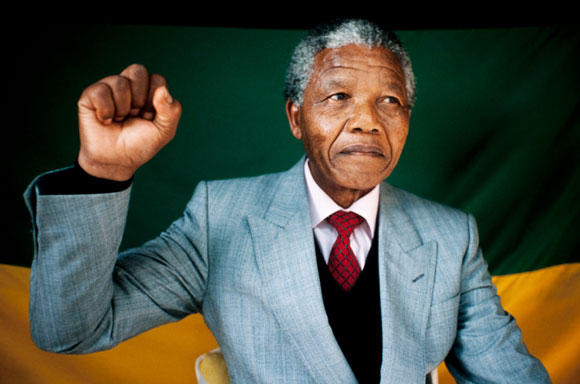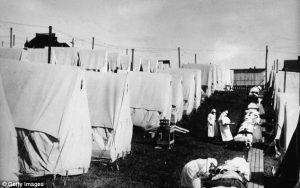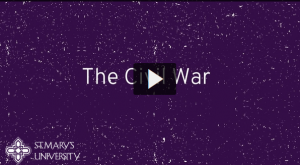Winner of the Spring 2019 StMU History Media Award for
Article with the Best Title
“I have fought against white domination, and I have fought against black domination. I have cherished the ideal of a democratic and free society in which all persons will live together in harmony and with equal opportunities. It is an ideal which I hope to live for and to see realized. But if it needs be, it is an ideal for which I am prepared to die.” 1
The world does not split between only black and white or good and bad. Shades of gray overtake our everyday lives and can make it difficult to navigate ethical dilemmas. Laws and rules do not necessarily make things clearer, nor black and white. Some rules, even those repeated throughout history, may neither be ethical nor positive for people or the societies on which these laws are imposed. If one breaks a law, one can be indicted as a criminal. However, breaking unjust laws provides the philosophical roots of civil disobedience and the motivation of freedom fighters. Nelson Mandela broke the highest law of his land and was tried for treason, not once, but twice. Yet, most recognize Nelson Mandela’s act as justified and he continues to be held in our highest regards, even winning a Nobel Peace Prize. How can one commit treason, be sentenced to life in jail, and still be one of the most beloved leaders and symbols of freedom around the world? Because Nelson Mandela fought for the freedoms of all his people, he fought against an unjust government determined to exploit and dehumanize all people of color, even the indigenous, the legitimate people of the land. Nelson Mandela did not betray the people; he committed treason against an oppressive government for all the right reasons. His world was literally divided into black and white, where white was always lawful, and Africans were always wrong. Mandela fought against laws that had no legitimacy.
On June 12, 1964, the courthouse and the streets around it were filled with those waiting to hear the verdict against Nelson Mandela and eight others during the Rivonia Trials. Judge Quartus de Wet delivered the news that these nine activists were sentenced to life in prison on the charges of conspiracy and sabotage, noting that the actions Mandela and the others committed were “in essence one of high treason” though he did not go as far as to implement the highest form of punishment in accordance with treason.2 The Rivonia Trials were supposed to end Mandela’s fight for justice for South Africa but in fact it only provided him the greatest international stage ever.

Mandela’s first arrest happened in 1952 when the African National Congress (ANC) and National Youth League was being led by Nelson Mandela. He organized a campaign called the “Campaign of Defiance against Unjust Laws,” which was the largest non-violent protest that South Africa had ever seen. The Defiance Campaign was also the first campaign to have all races included in one party in defiance of Apartheid rules by the ANC. 3 Mandela and the other leaders of the Defiance Campaign convinced hordes of volunteers to refuse carrying the books that designated their racial status and to go into the parts of the cities that were forbidden to them. Moreover, the Youth League defied curfews and violated segregation in governmental businesses, such as train stations and post offices. Despite the non-violent nature of the protests, the government became increasingly more worried about the protestors. Members of the Defiance Campaign were frequently arrested for the crimes they committed, but most were minor offenses and were short term prison sentences. This did nothing to stop the influx of volunteers. The numbers rose from 7,000 to 100,000. 4 In December 1952, Mandela was, along with nineteen others, charged for violating the Suppression of Communism Act. The government sentenced them to nine months in jail.
Four years later, in 1956, Mandela was arrested for the second time, during a raid on him home. In his autobiography, “Long Walk to Freedom,” he recalls his arrest that night, asking the arresting officer questions about overpowering him. When the officer said Mandela was playing with fire, he responded with “Playing with fire is my game.” 5” Mandela was put on trial and charged with treason, alongside 155 others, in what would become known as the “Treason Trial.” Four very long years later, the courts eventually found all defendants not guilty. The Treason Trial lasted four years for a number of reasons, mainly the number of people on trial. Defense Lawyer Israel Maisels argued that these individuals were not guilty because “Treason is a crime distinguished by the means used rather than the end” aimed for. 6
In 1960, the ANC was banned and when the trials concluded, Mandela, fearing for his life, fled to the underground, and eventually out of country, first Sudan, then other African countries and London, with a fake passport. During his time under ground and outside the country, the banned ANC gave him permission to gather the forces necessary to create and build an army, essentially taking an organization that treated nonviolence as its core, to a different kind of organization, with a future none could ever predict. 7

Mandela’s return to South Africa would lead to his third, and final, arrest, but not his last trial. Within days of returning, on August 5, 1962, on a drive to a meeting, Mandela was pulled over ending his seventeen months of unrestricted freedom he enjoyed outside of the country. 8 He was arrested and charged with five years imprisonment upon reentering South Africa for leaving and returning to the country without the proper paperwork and inciting violence. It was in this trial that Mandela fully realized who he could be in this fight for justice. He realized that he was “the symbol of justice in the court of the oppressor, the representative of the great ideals of freedom, fairness, and democracy in a society that dishonored those virtues. [He] realized then and there that [he] could carry on the fight even within the fortress of the enemy.”9”
This leads us back to where we started: The Rivonia Trials, which ended in twenty seven years of Nelson Mandela’s life in prison before becoming the first black Head of State for South Africa. In 1948, Apartheid became the system of governance and norms imposed on South Africans. Apartheid refers to total racial segregation, keeping white apart from all people of color. Under Apartheid, the minority led white government of South Africa divided the population in “whites”, “coloreds,” and “blacks.” Under Apartheid, many laws were passed that further segregated the country, like the Bantu Authorities Act in 1951, which designated areas where blacks were forced to resettled. 10 After spending 27 years in jails, and surviving from tuberculosis, Mandela’s fight had only but started. He strongly opposed De Klerk while working and negotiating with him to set up the rules for the first truly democratic elections in 1994. Unsurprisingly, the ANC and its presidential candidate, Mandela, won the election and proceeded to a peaceful tradition of power. Apartheid had been ended by parliament a few years earlier in order to pave the way for more democratization. Mandela purposefully did not seek reelection and went on to serve with the UN as a Special Envoy to help negotiate peace in other areas of the Africa Continent. While Mandela passed on December 5th, 2013, we should heed his words of advice that one cannot rest too long at the top of the hill for our freedom comes with many responsibilities and neither is our walk yet completed.
“I have walked that long road to freedom. I have tried not to falter; I have made missteps along the way. But I have discovered the secret that after climbing a great hill, one only finds that there are many more hills to climb. I have taken a moment here to rest, to steal a view of the glorious vista that surrounds me, to look back on the distance I have come.11”
“But I can rest only for a moment, for with freedom come responsibilities, and I dare not linger, for my long walk is not yet ended. 12”
- Nelson Mandela, Speech at Rivonia Trial, April 20 1964, The Telegraph, https://www.telegraph.co.uk/news/worldnews/nelson-mandela/10140564/Nelson-Mandelas-address-from-the-dock-at-the-Rivonia-Trial.html . ↵
- The State vs. Nelson Mandela and Others, Supreme Court of South Africa (June 12, 1964). ↵
- Sahoboss, “Defiance Campaign 1952,” South African History Online, March 19, 2018 http://www.sahistory.org.za/topic/defiance-campaign-1952. ↵
- Marcia Amidon Lusted, “Peaceful Protest,” Cobblestone 29, no. 4: 40, 2008. ↵
- Nelson Rolihlahla Mandela, Long Walk to Freedom, (Randburg: Macdonald Purnell, 1994):23. ↵
- Hisotircal Papers, The Treason Trial, Original Transcript, University of Witwatersrand and Johannesburg, http://www.historicalpapers.wits.ac.za/inventories/inv_pdfo/AD1812/AD1812-I1-001-jpeg.pdf . ↵
- “Timeline,” Nelson Mandela Foundation, Accessed April 08, 2019 https://www.nelsonmandela.org/content/page/timeline. ↵
- Nelson Rolihlahla Mandela, Long Walk to Freedom, (Randburg: Macdonald Purnell, 1994):49. ↵
- Nelson Rolihlahla Mandela, Long Walk to Freedom, (Randburg: Macdonald Purnell, 1994):49. ↵
- Salem Press Encyclopedia Research Starters, 2014, s.v. “Apartheid,” by Lucas, Emma T. ↵
- Nelson Rolihlahla Mandela, Long Walk to Freedom, (Randburg: Macdonald Purnell, 1994). ↵
- Nelson Rolihlahla Mandela, Long Walk to Freedom, (Randburg: Macdonald Purnell, 1994). ↵



63 comments
Carly Jimenez
This was a great article to read. Nelson Mandela fought the great fight and did not give up even though it seemed like the world was against him. even when being put in prison for something he shouldn’t have been in there for. he did not give up. This is a truly inspiring article because it goes into details about everything that he went through from leaving the country to coming back and fighting for what was right. His actions still live on today and his fight has not ended.
Paola Arellano
The quotes provided at the end of the article and during the article really made an impact in the way that I saw the story. The author of this article did you wonderful job of portraying the story and truly deserved her nominations. Nelson Mandela is one of the most influential people in history and continues to be talked about today. Of course there are laws the change for the better and he was no stranger to being able to cause a change in our country. Nelson was able to see the bigger picture in our country moving forward and I think that his story was important to tell. He did not fight for anything I’m just a boy reason but was making sure that America was moving forward and although there was much disapproval he kept fighting which shows a lot of character.
Victoria Salazar
I absolutely loved this article! Nelson Mandela will always be one of the greatest influencers and game-changers of society. Being an International and Global Studies major, we go into depth when learning about developing countries. He took a spiraling nation, and gave it some stability and someone they could put their trust in. I think it is just so amazing to read about someone who cared for their nation to the point of wrongful imprisonment – without holding a grudge when he became president some years later.
Chelsea Alvarez
The leadership and power that Nelson Mandela held for people is incredibly admiring. His bravery to go against the law and be committed for treason really shows the kind of individual that he is. This article really encompassed the movement that began because of Mandela and he took complete responsibility for seeking change. The influence that Mandela had continues as more and more people now are no longer afraid to speak up when their government is acting in an unethical manner.
Natalie Thamm
This is a fantastic article and I love the quote that it began with, because it is incredibly powerful, and a sentiment expressed across many movements of liberation. It is crazy that Nelson Mandela went from being tried for treason twice to President and Nobel Peace Prize recipient. The author did a great job of telling Mandela’s story and highlighting some of the many reasons he is so beloved.
Ruben Basaldu
Everyone has at least heard of the man known as Nelson Mandela. He was one of the most influential leaders ever to have lived. What I really admire about Mandela is that he did not want to fight he wanted to work things out peacefully and that is something that I think that we need more of in today’s world. I think that this article is great and is very deserving of the nomination.
Sharriah Martinez
congrats for your nomination for best title. This title definitely caught my attention it was very creative. Nelson Mandela was a beautiful soul, he was in influential leader, inspiring man and someone who fought for the right to live. I loved how the article started almost like a poem, someting I woud hear out if my american literature course. Nelson Mandela saw the bigger picture, he was not fighting for a specific party nor opinions of other people he fought for the right to life.
Diego Terrazas
It is admirable when people are willing to die for positive causes they strongly believe in. Mandela is a righteous character who exemplified the role and significance of a true leader. Mandela realizes that violence only begets more violence which would not move the cause forward. The only effective way to move such causes forward is to peacefully protest against the unjust.
Hali Garcia
This is an outstanding article!!! I agree with your intro, everything is most definitely not black and white, and law do create shades of gray. Nelson Mandela is truly a remarkable and inspirational person. What I admire about Nelson Mandela is that he does fight for equality for ALL, not for just a select few and is willing to be the change himself. Great job and congratulations on your nomination!!!
Dalton Moy
This is a great article. I think everyone has learned about Nelson Mandela at some point during their schooling. This article really does an awesome job of describing his life when he was thrown in prison. He was a man who was not afraid of what would be done to him when he tried to do something for the benefit of his people. He is an inspiration to all.